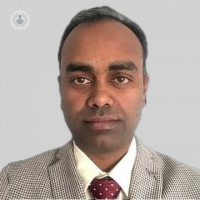Psychiatric treatment of compulsive/hyperactive thinking
Autore:Compulsive or hyperactive thinking is often characterised by repetitive, uncontrollable thoughts that can overwhelm a person's mental space. These thought patterns are commonly associated with conditions such as obsessive-compulsive disorder (OCD), anxiety disorders, and attention-deficit hyperactivity disorder (ADHD). Psychiatric treatment aims to address the underlying causes of these thought patterns and help patients regain control over their mental state.

What is compulsive/hyperactive thinking?
Compulsive thinking refers to intrusive thoughts or mental habits that are persistent and difficult to ignore. These thoughts can be distressing, repetitive, and often interfere with daily functioning.
Hyperactive thinking, on the other hand, is characterised by rapid, racing thoughts that may jump from one subject to another without focus. Both types of thinking can contribute to significant mental strain and anxiety.
What conditions are associated with compulsive or hyperactive thinking?
Compulsive and hyperactive thinking are often linked to several mental health disorders, including:
- Obsessive-compulsive disorder (OCD): In OCD, compulsive thinking is characterised by intrusive, unwanted thoughts (obsessions) that are often distressing. These are typically followed by repetitive behaviours or mental rituals (compulsions) aimed at reducing the anxiety caused by the thoughts.
- Generalised anxiety disorder (GAD): People with GAD often experience constant worry and rumination, where their thoughts become excessively focused on possible negative outcomes.
- Attention-deficit hyperactivity disorder (ADHD): Individuals with ADHD often struggle with hyperactive thinking, where their mind races from one thought to another, making it hard to focus or stay on task.
- Depression and mood disorders: Overthinking and rumination are common in depression, where individuals may become preoccupied with negative thoughts or perceived failures.
How is compulsive/hyperactive thinking treated by psychiatrists?
Psychiatric treatment for compulsive or hyperactive thinking typically involves a combination of therapy, medications and lifestyle changes. The goal is to help patients manage their thoughts, reduce distress and improve their quality of life. Treatment options include:
1. Cognitive behavioural therapy (CBT)
Cognitive behavioural therapy is a widely used therapeutic approach for managing compulsive or hyperactive thinking. CBT helps patients identify and challenge irrational or unhelpful thought patterns, replacing them with more balanced, rational thinking. For individuals with OCD, CBT may include exposure and response prevention (ERP), where the patient is gradually exposed to their obsessive thoughts without performing the compulsive behaviour.
2. Mindfulness-based therapies
Mindfulness-based cognitive therapy (MBCT) and other mindfulness techniques are effective in reducing the impact of compulsive thinking. Mindfulness involves focusing on the present moment without judgement, helping individuals observe their thoughts without getting caught up in them. This can reduce the intensity of racing thoughts and improve emotional regulation.
3. Medications
Medication can be an important part of managing compulsive or hyperactive thinking, particularly for individuals with conditions such as OCD, ADHD or anxiety disorders. Common medications include:
- Selective serotonin reuptake inhibitors (SSRIs): These antidepressants are frequently prescribed to manage OCD and anxiety disorders by regulating serotonin levels in the brain, which helps reduce the severity of obsessive thoughts.
- Stimulants and non-stimulants for ADHD: In patients with ADHD, medications such as stimulants (e.g., methylphenidate) or non-stimulant options (e.g., atomoxetine) can help improve focus and reduce hyperactive thinking.
- Anxiolytics or antidepressants: Medications that reduce anxiety or depressive symptoms can also help alleviate compulsive thinking in conditions such as generalised anxiety disorder or depression.
4. Lifestyle modifications
Lifestyle changes play a crucial role in managing compulsive or hyperactive thinking. Psychiatrists often recommend techniques such as:
- Regular physical activity: Exercise is known to reduce anxiety and improve focus, helping manage racing or obsessive thoughts.
- Sleep hygiene: Proper sleep is essential for mental clarity, and inadequate sleep can exacerbate hyperactive thinking.
- Relaxation techniques: Techniques such as deep breathing, progressive muscle relaxation, or yoga can help reduce mental stress and slow down racing thoughts.
Can compulsive/hyperactive thinking be cured?
Compulsive and hyperactive thinking can be managed effectively with the right treatment, but it is not always ‘curable’ in the traditional sense. Instead, psychiatric care focuses on helping individuals develop strategies to control their thoughts and reduce their impact on daily life. With ongoing therapy and, in some cases, medication, many patients experience significant relief from these symptoms.
When should you seek help for compulsive or hyperactive thinking?
If compulsive or hyperactive thinking begins to interfere with your daily functioning, relationships or quality of life, it is important to seek help from a mental health professional. Early intervention can help prevent these thought patterns from worsening and provide tools for better managing your mental health. Psychiatrists are well-equipped to assess the underlying causes and create a personalised treatment plan for long-term improvement.
Compulsive and hyperactive thinking can be challenging to live with, but with psychiatric intervention, they can be effectively managed. Cognitive behavioural therapy, mindfulness practices, medications, and lifestyle changes can all contribute to better control of these thought patterns, allowing individuals to lead a more balanced and fulfilling life. If you or a loved one are experiencing these symptoms, seeking professional help is an important step towards recovery.


